Specify Conditions Using Query Operators
Use query operators in a query filter document
to perform more complex comparisons and evaluations.
To return all movies from the sample_mflix.movies collection which are either rated PG or PG-13:
This operation corresponds to the following SQL statement:
Specify Logical Operators (AND / OR)
AND conjunction connects the clauses of a compound query so that the query selects the documents in the collection that match all the conditions.| use sample_mflix |
| db.movies.find( { countries: "Mexico", "imdb.rating": { $gte: 7 } } ) |
$or operator to specify a compound query that joins each clause with a logical OR conjunction so that the query selects the documents in the collection that match at least one condition.sample_mflix.movies collection which were released in 2010 and either won at least 5 awards or have a genre of Drama:| use sample_mflix |
| db.movies.find( { |
| year: 2010, |
| $or: [ { "awards.wins": { $gte: 5 } }, { genres: "Drama" } ] |
| } ) |
Comparison Operators
MongoDB comparison operators can be used to compare values in a document. The following table contains the common comparison operators.
| Operator | Description |
| $eq | Matches values that are equal to the given value. |
| $gt | Matches if values are greater than the given value. |
| $lt | Matches if values are less than the given value. |
| $gte | Matches if values are greater or equal to the given value. |
| $lte | Matches if values are less or equal to the given value. |
| $in | Matches any of the values in an array. |
| $ne | Matches values that are not equal to the given value. |
| $nin | Matches none of the values specified in an array. |
$eq Operator
In this example, we retrieve the document with the exact _id value “LS0009100”.
db.inventory.find({"_id": { $eq: "LS0009100"}}).pretty()
Result:
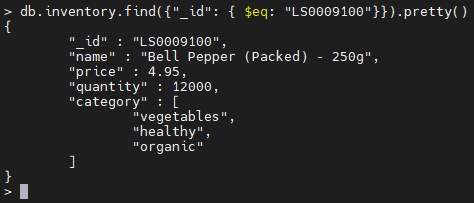
$gt and $lt Operators
In this example, we retrieve the documents where the `quantity` is greater than 5000.
db.inventory.find({"quantity": { $gt: 5000}}).pretty()
Result:
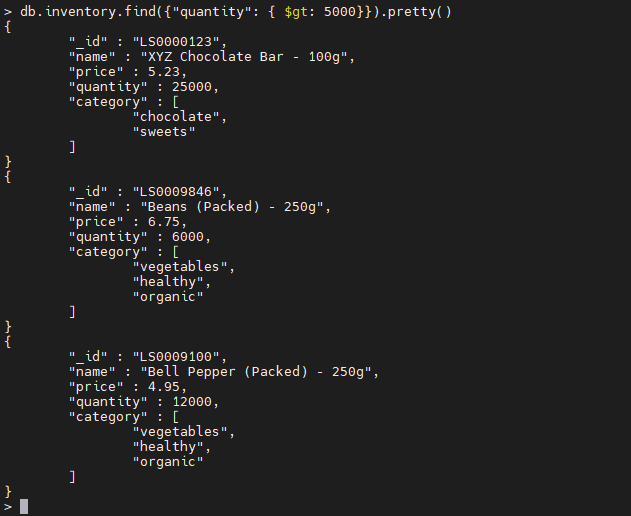
Let’s find the documents with the ‘quantity’ less than 5000.
db.inventory.find({"quantity": { $lt: 5000}}).pretty()
Result:
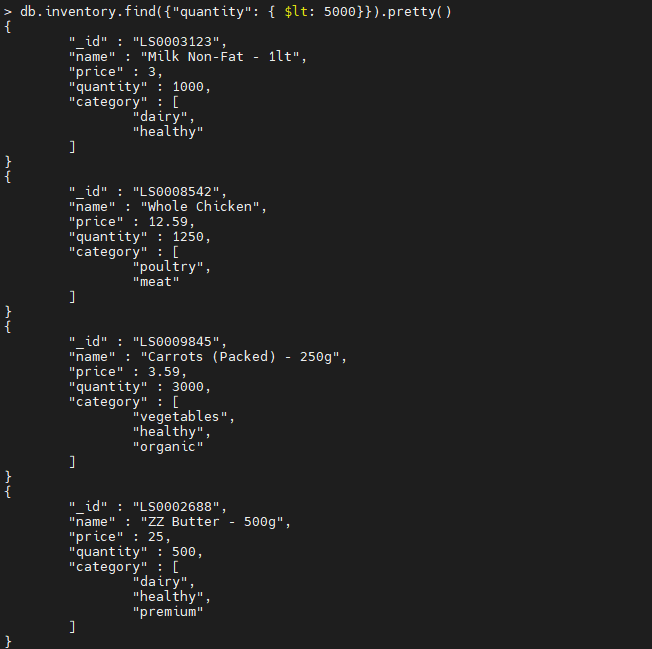
$gte and $lte Operators
Find documents with ‘quantity’ greater than or equal to 5000.
db.inventory.find({"quantity": { $gte: 12000}}).pretty()
Result:
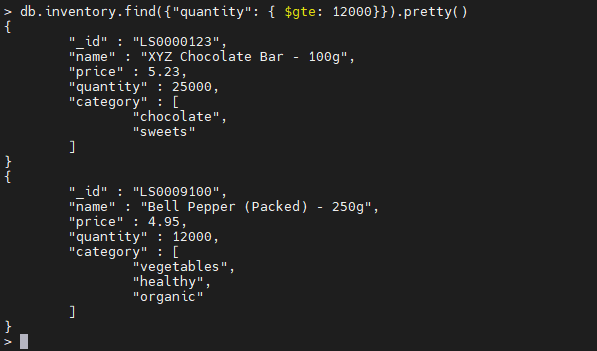
The following query returns documents where the quantity is less than or equal to 1000.
db.inventory.find({"quantity": { $lte: 1000}}).pretty()
Result:
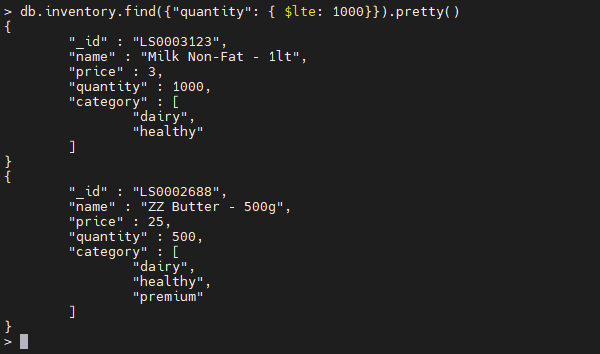
$in and $nin Operators
The following query returns documents where the price field contains the given values.
db.inventory.find({"price": { $in: [3, 6]}}).pretty()
Result:
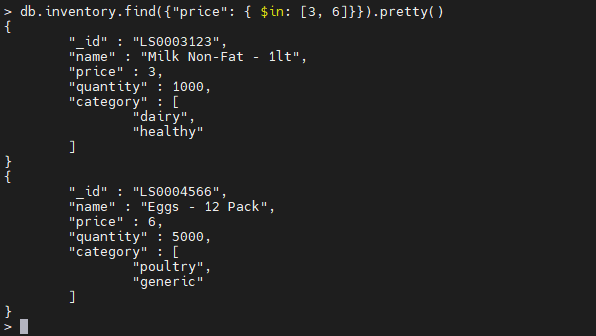
If you want to find documents where the price fields do not contain the given values, use the following query.
db.inventory.find({"price": { $nin: [5.23, 3, 6, 3.59, 4.95]}}).pretty()
Result:
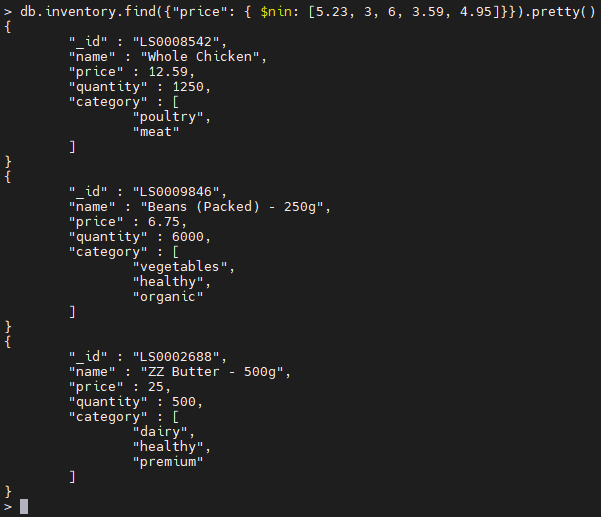
$ne Operator
Find documents where the value of the price field is not equal to 5.23 in the inventory collection.
db.inventory.find({"price": { $ne: 5.23}})
Result:
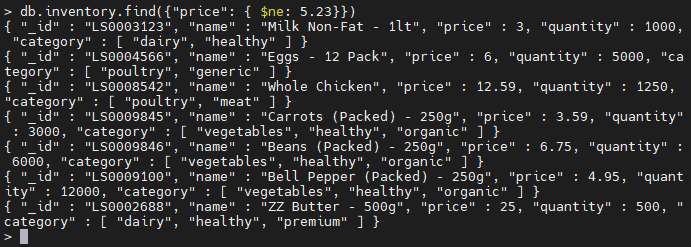
Logical Operators
MongoDB logical operators can be used to filter data based on given conditions. These operators provide a way to combine multiple conditions. Each operator equates the given condition to a true or false value.
Here are the MongoDB logical operators:
| Operator | Description |
| $and | Joins two or more queries with a logical AND and returns the documents that match all the conditions. |
| $or | Join two or more queries with a logical OR and return the documents that match either query. |
| $nor | The opposite of the OR operator. The logical NOR operator will join two or more queries and return documents that do not match the given query conditions. |
| $not | Returns the documents that do not match the given query expression. |
$and Operator
Find documents that match both the following conditions
- job_role is equal to “Store Associate”
- emp_age is between 20 and 30
db.employees.find({ $and: [{"job_role": "Store Associate"}, {"emp_age": {$gte: 20, $lte: 30}}]}).pretty()
Result:

$or and $nor Operators
Find documents that match either of the following conditions.
- job_role is equal to “Senior Cashier” or “Store Manager”
db.employees.find({ $or: [{"job_role": "Senior Cashier"}, {"job_role": "Store Manager"}]}).pretty()
Result:

Find documents that do not match either of the following conditions.
- job_role is equal to “Senior Cashier” or “Store Manager”
db.employees.find({ $nor: [{"job_role": "Senior Cashier"}, {"job_role": "Store Manager"}]}).pretty()
Result:
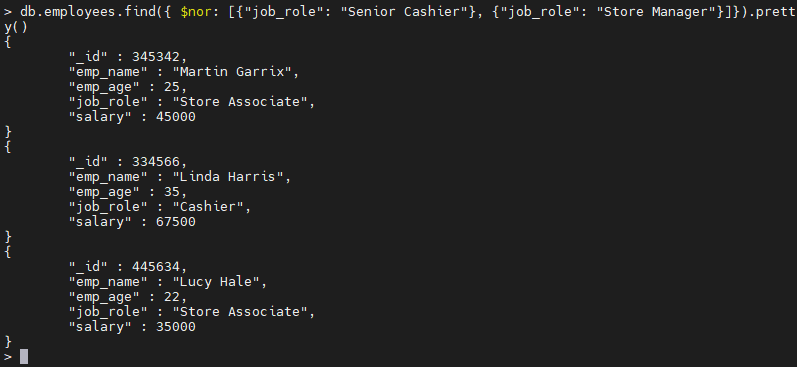
$not Operator
Find documents where they do not match the given condition.
- emp_age is not greater than or equal to 40
db.employees.find({ "emp_age": { $not: { $gte: 40}}})
Result:

Element Operators
The element query operators are used to identify documents using the fields of the document. The table given below lists the current element operators.
| Operator | Description |
| $exists | Matches documents that have the specified field. |
| $type | Matches documents according to the specified field type. These field types are specified BSON types and can be defined either by type number or alias. |
$exists Operator
Find documents where the job_role field exists and equal to “Cashier”.
db.employees.find({ "emp_age": { $exists: true, $gte: 30}}).pretty()
Result:
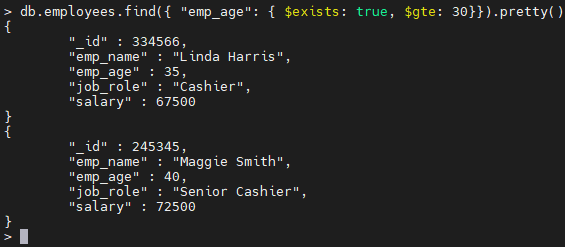
Find documents with an address field. (As the current dataset does not contain an address field, the output will be null.)
db.employees.find({ "address": { $exists: true}}).pretty()
Result:
![]()
$type Operator
The following query returns documents if the emp_age field is a double type. If we specify a different data type, no documents will be returned even though the field exists as it does not correspond to the correct field type.
db.employees.find({ "emp_age": { $type: "double"}})
Result:

db.employees.find({ "emp_age": { $type: "bool"}})
Result:
![]()
Evaluation Operators
The MongoDB evaluation operators can evaluate the overall data structure or individual field in a document. We are only looking at the basic functionality of these operators as each of these operators can be considered an advanced MongoDB functionality. Here is a list of common evaluation operators in MongoDB.
| Operator | Description |
| $jsonSchema | Validate the document according to the given JSON schema. |
| $mod | Matches documents where a given field’s value is equal to the remainder after being divided by a specified value. |
| $regex | Select documents that match the given regular expression. |
| $text | Perform a text search on the indicated field. The search can only be performed if the field is indexed with a text index. |
| $where | Matches documents that satisfy a JavaScript expression. |
$jsonSchema Operator
Find documents that match the following JSON schema in the promo collection.
The $let aggregation is used to bind the variables to a results object for simpler output. In the JSON schema, we have specified the minimum value for the “period” field as 7, which will filter out any document with a lesser value.
let promoschema = { bsonType: "object", required: [ "name", "period", "daily_sales" ], properties: { "name": { bsonType: "string", description: "promotion name" }, "period": { bsonType: "double", description: "promotion period", minimum: 7, maximum: 30 }, "daily_sales": { bsonType: "array" } } }
db.promo.find({ $jsonSchema: promoschema }).pretty()
Result:
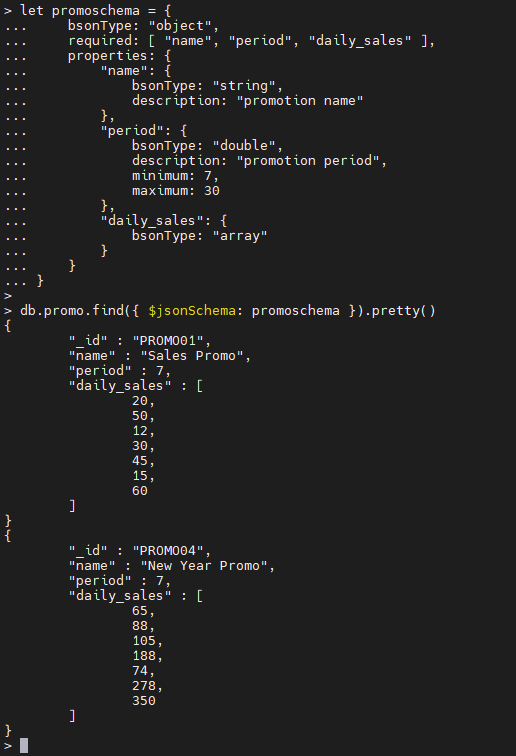
$mod Operator
Find documents where the remainder is 1000 when divided by 3000 in the inventory collection.
Note that the document “Milk Non-Fat – 1lt” is included in the output because the quantity is 1000, which cannot be divided by 3000, and the remainder is 1000.
db.inventory.find({"quantity": {$mod: [3000, 1000]}}).pretty()
Result:
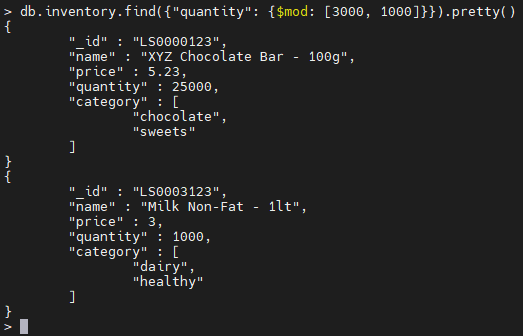
$regex Operator
Find documents that contain the word “Packed” in the name field in the inventory collection.
db.inventory.find({"name": {$regex: '.Packed.'}}).pretty()
Result:
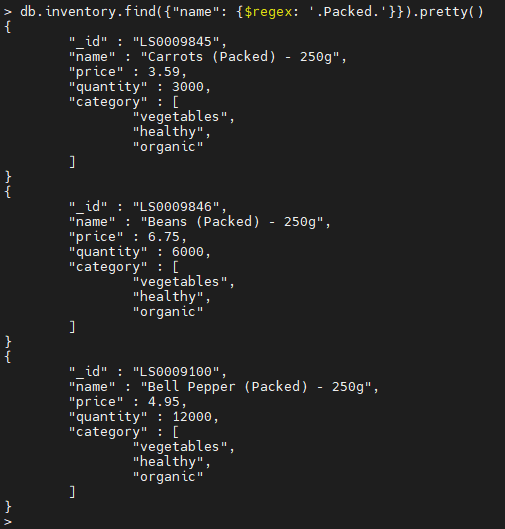
$text Operator
Find documents by using a text searching for “Non-Fat” in the name field. If the field is not indexed, you must create a text index before searching.
db.inventory.createIndex({ "name": "text"})
Result:

db.inventory.find({ $text: { $search: "Non-Fat"}}).pretty()
Result:
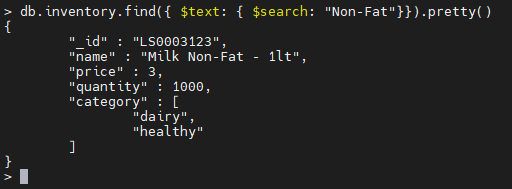
$where Operator
Find documents from the “payments” collection where the _id field is a string type and equals the given md5 hash defined as a JavaScript function.
db.payments.find({ $where: function() { var value = isString(this._id) && hex_md5(this._id) == '57fee1331906c3a8f0fa583d37ebbea9'; return value; }}).pretty()
Result:

Array Operators
MongoDB array operators are designed to query documents with arrays. Here are the array operators provided by MongoDB.
| Operator | Description |
| $all | Matches arrays that contain all the specified values in the query condition. |
| $size | Matches the documents if the array size is equal to the specified size in a query. |
| $elemMatch | Matches documents that match specified $elemMatch conditions within each array element. |
$all Operator
Find documents where the category array field contains “healthy” and “organic” values.
db.inventory.find({ "category": { $all: ["healthy", "organic"]}}).pretty()
Result:
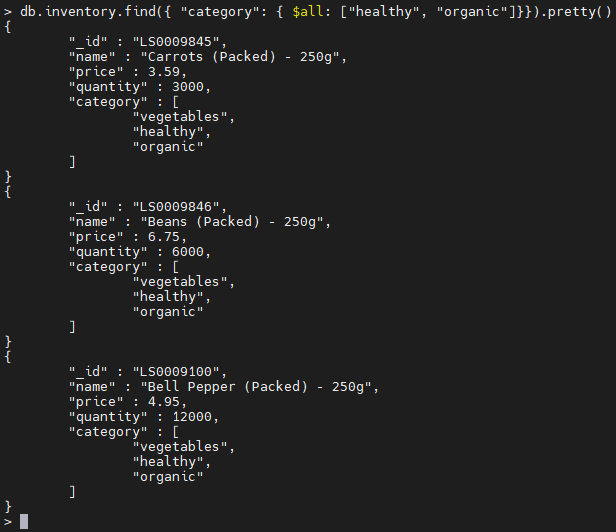
$size Operator
Find documents where the category array field has two elements.
db.inventory.find({ "category": { $size: 2}}).pretty()
Result:
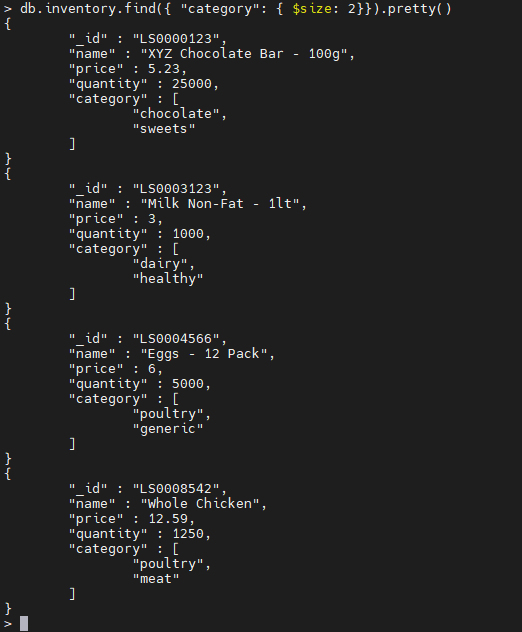
$elemMatch Operator
Find documents where at least a single element in the “daily_sales” array is less than 200 and greater than 100.
db.promo.find({ "daily_sales": { $elemMatch: {$gt: 100, $lt: 200}}}).pretty()
Result:
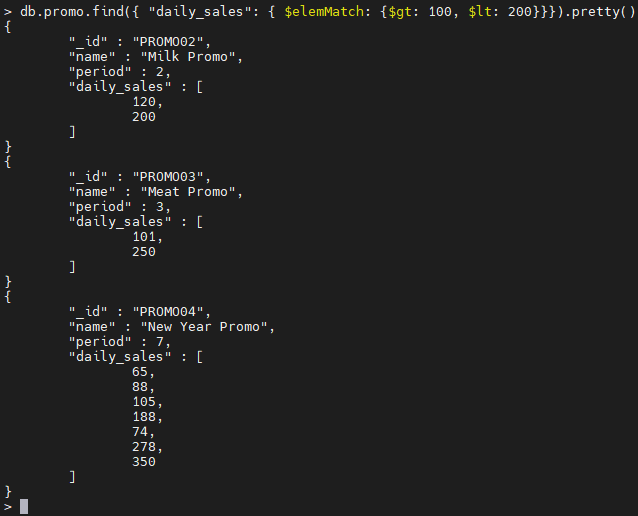
Comment Operator
The MongoDB comment query operator associates a comment to any expression taking a query predicate. Adding comments to queries enables database administrators to trace and interpret MongoDB logs using the comments easily.
$comment Operator
Find documents where the period is equal to 7 in promo collection while adding a comment to the find operation.
db.promo.find({ "period": { $eq: 7}, $comment: "Find Weeklong Promos"}).pretty()
Result:
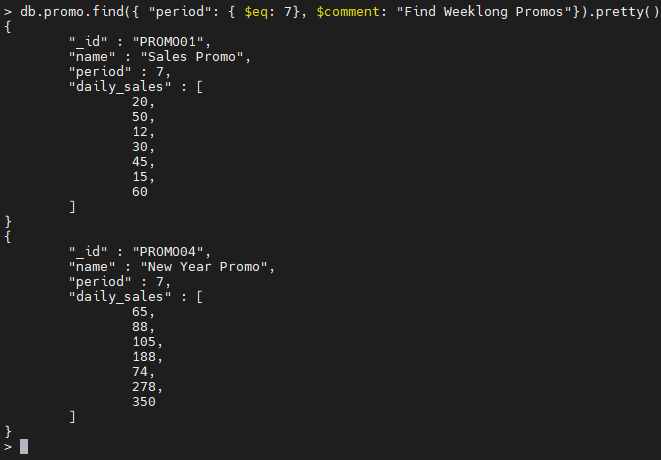
Adding comments lets users easily identify commands in MongoDB logs. The above operation will be logged as follows.
db.adminCommand( { getLog:'global'} ).log.forEach(x => {print(x)})
Result:

